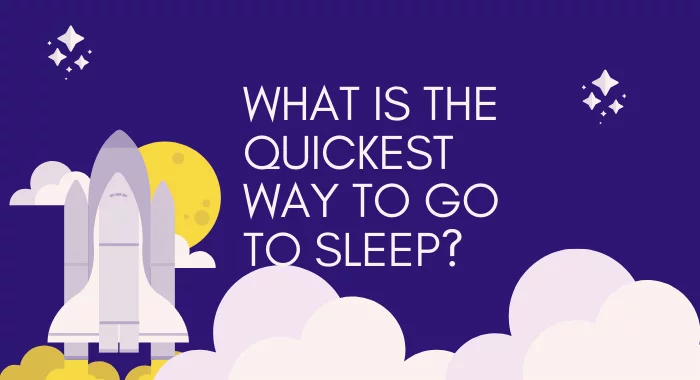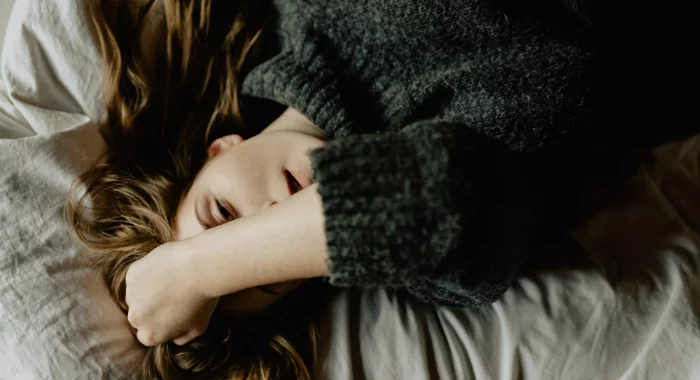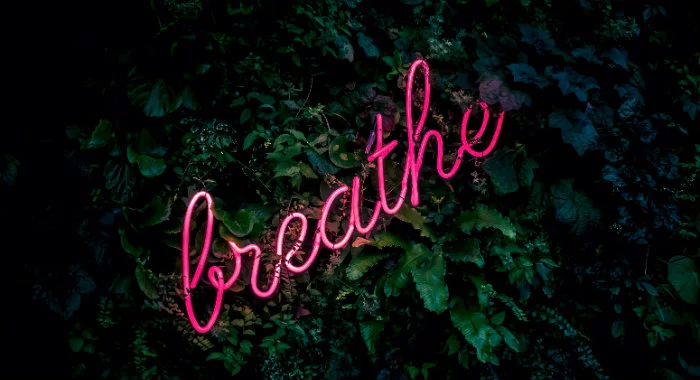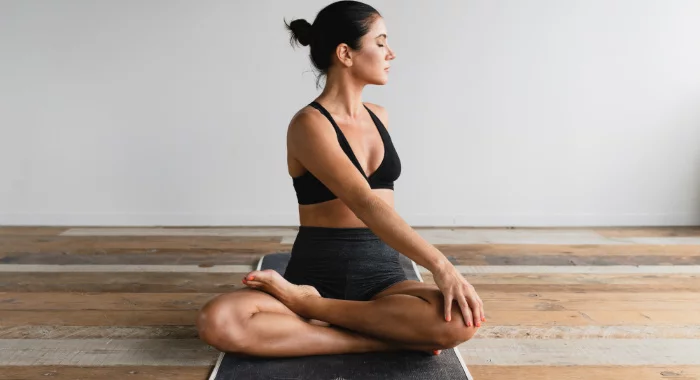The Quickest Way To Go To Sleep
What Is The Quickest Way To Go To Sleep?

There’s nothing worse than laying in bed at night, completely exhausted but not able to get to sleep. Even worse, the more you try and force it, the harder it is to fall asleep.
It’s a nightmare.
If you don’t get your recommended hours of sleep, you’ll be tired and in a terrible mood the next day. I know I am, especially before breakfast. But lack of sleep doesn’t just affect your mood. Over the long term, it can also cause a number of serious health risks and conditions, like an increased risk of type 2 diabetes, cancer and heart disease.
Sleep is important, but that doesn’t make it easy. Sleep is like a wild creature. You can’t chase it – you need to relax and let it come to you. But that doesn’t mean there aren’t a few tricks you can use to cut this time in half.
Want to know how to fall asleep in 5 minutes? Read on to find the methods and tips to get to sleep quickly…
How long should it take to fall asleep?
Before we launch into the tips to fall asleep quickly, we need to talk about how long it should take you to fall asleep.
The average time to fall asleep takes between 10-20 minutes.
This is important to know because if you don’t fall between those averages, this could be an indication that there is something amiss with your sleep routine.

For example, if it regularly takes you longer than 20 minutes to get to sleep, this could be a sign that you suffer from a sleep disorder. This is fairly common, as approximately a third of the UK suffer from insomnia. With more than 70 different kinds of sleep disorders out there, you might want to spend some time exploring if one of these conditions is holding you back.
Knowing what is preventing you from sleeping is the first step towards a great night.
On the reverse side of this, if you’re falling asleep as soon as your head hits the pillow, you might not be getting enough sleep. This means you’re running your body past your exhaustion point, not giving yourself time to rest and recover. Over time, this will put you at more risk of health conditions.
The only way to fix this is to ensure that you are getting your recommended hours of sleep each night.
How do you fall asleep in 5 minutes?
Here are the tips and methods you need to know if you want to get to sleep as quickly as 5 minutes. Ready?
1. Try the 4-8-7 method
This is a breathing method that is designed to help relax your muscles and mind, making sleep come quicker to you. It’s also a helpful method to try during the day if you’re feeling stressed out or anxious.
It’s called the 4-8-7 method because this tells you how long you need to breathe. So, with this method, you:

- Breathe in for 4 seconds through your nose. Try to fill your lungs and feel your chest expand as you do so.
- Hold your breath for 7 seconds. Count slowly in your head as you do this.
- Slowly breathe out through your mouth for 8 seconds. And when we say slowly, we mean it. Work on slowly releasing your breath and feel your chest relax with each second.
- Repeat until you’re asleep.
This breathing method is a bit of a 2 in one. The deep breathing will help relax your muscles, but by concentrating on counting you’ll also be able to practice mindfulness. This will help clear your mind, stopping you from thinking about the same things over and over.
This method does get easier with time. Like anything, it needs practice. If you find yourself distracted, don’t be too hard on yourself. Just stop and begin the count again.
2. Pretend you’re really, really tired
This might sound like something you tell a child, but trust us here. Pretending that you’re really tired can trick your brain into thinking that you are – helping send you to sleep faster.
This involves a little bit more effort than simply throwing your hands up and going “oh wow! I’m really tired!”.
So take a moment to think about what physically happens when you’re really tired.
- Do your arms and legs feel heavy?
- Do you feel like you’re glued to the spot?
- Do you have trouble keeping your eyes open?
- And so on.
Once you’ve identified them, mimic them. Pretend that your arms are heavy. Imagine that you’re glued to the spot and you can’t keep your eyes open.
You’ll be asleep before you know it.
3. Use sleep apps or hypnosis videos

There are hundreds of apps and videos that are designed to help you fall asleep better.
If you use mindful meditation apps like Headspace, they even offer sleep podcasts that are like someone reading you a bedtime story until you fall asleep. I’m personally a fan of the loch dormant one – there’s just something about the Scottish accent and baritone of his voice that makes me very sleepy.
These don’t work for everyone. But for some people, they’re a great way to clear your mind by simply listening to something else.
A 2014 study found that those who used hypnosis videos to go to sleep also reported better quality of sleep. So, it’s worth a try.
4. Forget sleep and enjoy being in bed
This might seem like the opposite of tip 2, but it can also help people get to sleep pretty fast.
This method is all about trying to stop worrying about sleep. So, when you get in bed, don’t worry about how long it will take you to get to sleep. Try and push all those thoughts from your mind and just concentrate on being in bed.
Think about how comfortable you are. Do a mental body scan, starting from the tip of your toes to the top of your head and feel each muscle relax down into the bed.
The more comfortable you are and the less you worry, the quicker you’ll fall asleep.
5. Progressive muscle relaxation (PMR)

Progressive muscle relaxation, or deep muscle relaxation, is a set of exercises that you can do in bed to help release tension and help your muscles relax.
Before you start this, take the time to do some deep breaths to help relax you. If you want, you can also practice the 4-7-8 method here.
Once that’s done, try the following exercises:
- Raise your eyebrows as high as possible for 5 seconds. Then, relax and notice the difference in your forehead muscles;
- Wait 10 seconds;
- Smile widely to create tension in your cheeks. Hold for 5 seconds, then relax for 10 seconds;
- Squint with your eyes shut. Hold 5 seconds, then relax for 10 seconds;
- Tilt your head back slightly to look at the ceiling. Hold 5 seconds, then slowly sink your head back down into the pillow. Relax for 10 seconds;
- Move down the rest of your body, starting with your shoulders and working down your arms, back, legs and feet. Tense each muscle for 5 seconds, then relax for 10.
The chances are, you’ll never finish step 6. You’ll be asleep before you find your way to your toes.
Don’t worry about what order you do this either. Start from either the top or bottom and just tense each muscle for 5 seconds before relaxing for 10. As you relax, notice how your body is feeling and let your tension slip away.
What to do when you can’t fall asleep
Like most things in life, you can’t always expect results straight away. The above 5 tips are great ways to fall asleep quickly, but they take time to practice and learn.
So if you’ve been in bed for a while and are struggling to fall asleep, here’s what you can do.
Don’t look at a clock

If you can’t sleep, don’t check the time. There is literally no situation where finding out what the time is will make you sleep better. Trust me.
Checking the time will just do one thing: make you worry. If you look at it’s 2 am, the first thing you’ll do is work out how much sleep you’ll get if you fall asleep now. That just puts more pressure on you to go to sleep, making it harder.
Clock watching is a bad habit to get into. So, do yourself a favour and remove the clocks from your room and don’t immediately try and grab your phone.
Get out of bed
If you’re struggling to sleep, laying there isn’t going to do anything. So, physically get yourself out of bed and walk around your house for a bit.
When you’re out of bed, don’t do anything too strenuous. Try making yourself a drink or doing a bit of light reading until you feel ready to go back to bed.
Don’t look at a screen
Looking at a screen is bad for sleep. That’s because the light will prevent your body from producing melatonin, which is the hormone responsible for sending you to sleep.

No matter how tempting it might be to turn on the TV, get out your laptop of scroll through your phone – don’t do it. You’ll just make it harder to sleep.
More sleep tricks: what you need to do before bed
The above methods are great ways to fall asleep quickly. But it’s worth mentioning that they are going to be at their most effective when you use them inside a healthy sleep routine.
This includes trying to keep to regular sleeping times, going to bed and waking up at roughly the same time each day. This programmes your body into getting used to a set routine, making it easier for you to sleep and wake up during those times.
It’s also worth getting into the habit of winding down before bed. This is where you basically take the time to relax for an hour before you try and sleep, allowing you to let go of the stress of the day.
This could involve anything like:
- A warm bath or shower;
- Reading a book and avoiding screen time;
- Doing really light exercise like yoga or stretching;
- Writing in a journal;
- Doing meditation exercises.
However you relax, try getting to the habit of doing this before bed.
It’s also helpful to avoid caffeinated drinks in the afternoon and make sure that your bedroom is clean and distraction-free.
Get to sleep, fast
Using the above methods and tips, you’re on your way to getting to sleep in no time.
Just remember that these may take some time to get used to. If you don’t see immediate results, stick at it. Try it for a few weeks and measure how much of a difference they make to your night.
Need more help getting the best night’s sleep? See our sleeping tips and tricks here.
Need more help getting the best night’s sleep? See our sleeping tips and tricks here.


Post a Comment